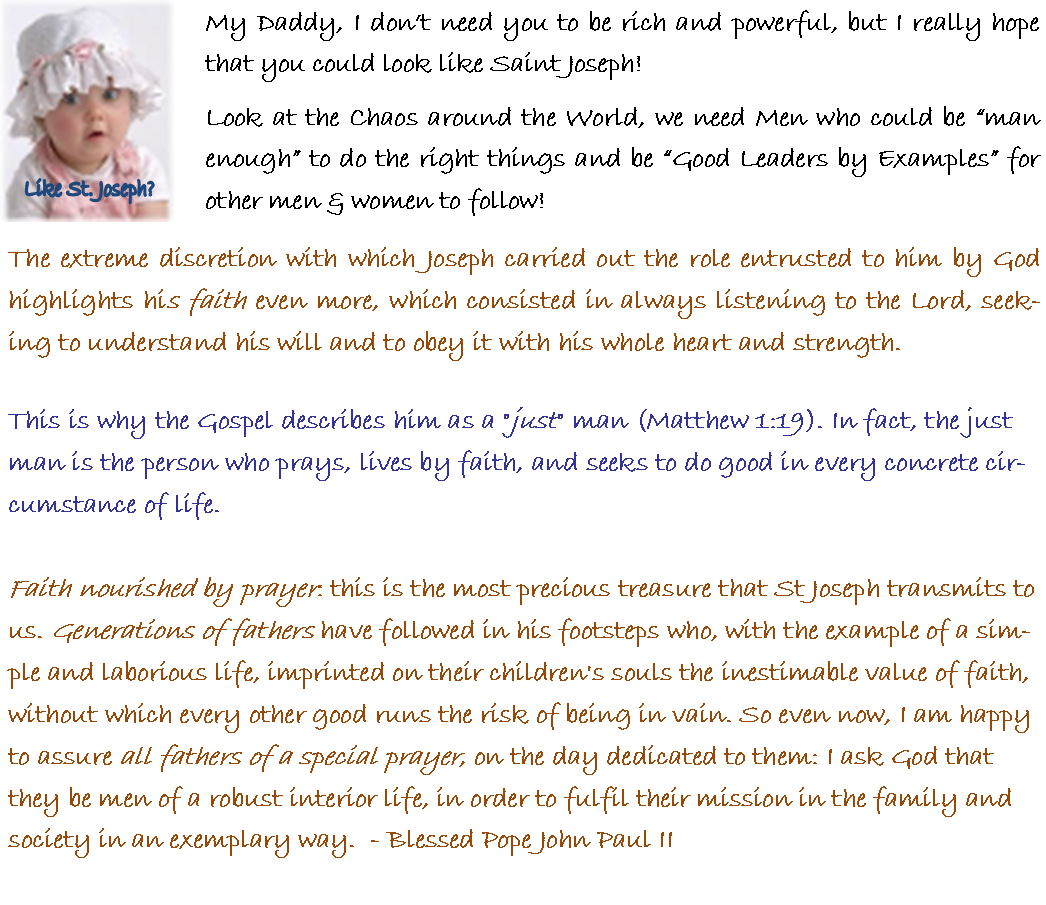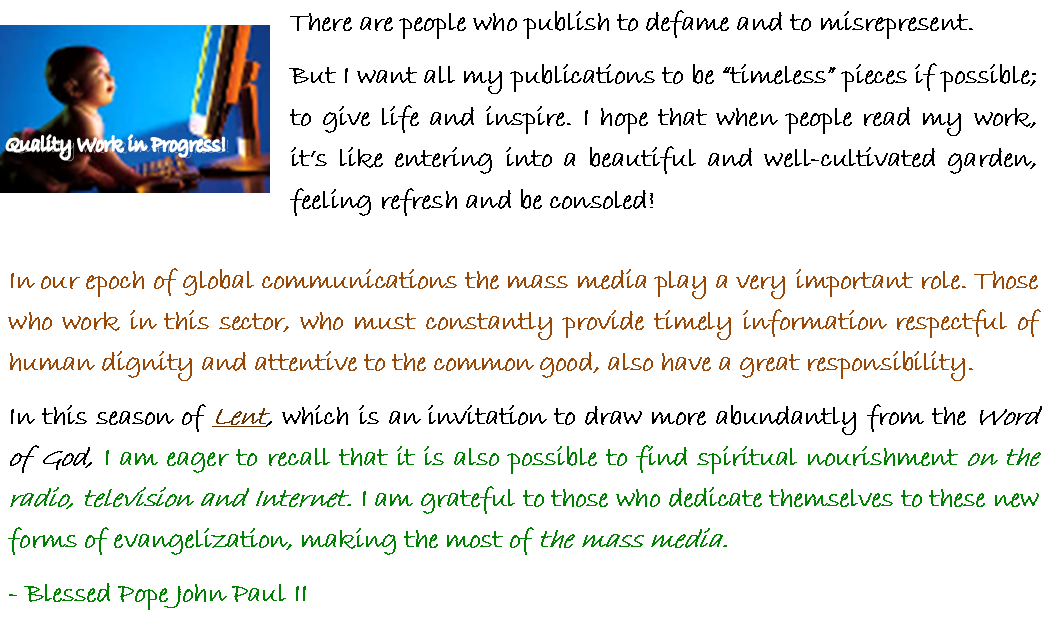JOHN PAUL II
ANGELUS
Fifth Sunday of Lent, 13 March 2005
At noon, seated at a window on the 10th floor of the Gemelli Polyclinic, the Holy Father blessed and spoke briefly to the faithful gathered in the square below. Archbishop Leonardo Sandri, Substitute of the Secretariat of State, then read the prayer of the Angelus. The event was relayed via television to St Peter's Square, while the Holy Father viewed images of the faithful in the Square.
Dear Brothers and Sisters,
1. In these days of my hospital stay here at the Gemelli, I have been particularly aware of the presence and attention of so many people who work in the mass media. Today I want to offer them a word of gratitude, for I am well aware of the sacrifices they make in carrying out their appreciated service, thanks to which the faithful in every part of the world can feel that I am closer and can accompany me with their affection and prayers.
2. In our epoch of global communications the mass media play a very important role. Those who work in this sector, who must constantly provide timely information respectful of human dignity and attentive to the common good, also have a great responsibility.
In this season of Lent, which is an invitation to draw more abundantly from the Word of God, I am eager to recall that it is also possible to find spiritual nourishment on the radio, television and Internet. I am grateful to those who dedicate themselves to these new forms of evangelization, making the most of the mass media.
3. Lastly, let us pray to Mary Most Holy so that she will help us to prepare properly for Holy Week, which begins next Sunday. I hope to see many young people in St Peter's Square taking part in the solemn Palm Sunday liturgy that is a spiritual preparation for the World Youth Day, scheduled to take place in Cologne, Germany.
-----------------------------------------------------------------------------------
After the recitation of the Angelus, the Holy Father said:
Dear brothers and sisters, thank you for your visit. Long live Wadowice! I greet the Legionaries of Christ. A happy Sunday and a good week to all!
Acknowledgment: We thank the Vatican Publisher for allowing us to publish the Homilies of Blessed Pope John Paul II, so that they could be accessed by more people all over the world; as a source of God’s encouragements to all of us.
PAPAL HOMILY AT ROME'S SAN LORENZO INTERNATIONAL YOUTH CENTRE
I survived because "I knew I was expected'
On Sunday, 9 March, the Fifth Sunday of Lent, the Holy Father visited San Lorenzo International Youth Centre and celebrated Mass in the tiny Church of San Lorenzo in Piscibus, close to the Vatican. The following is a translation of the Pope's Homily, given in Italian and part extemporaneously.
Your Eminences,
Venerable Brothers in the Episcopate and Priesthood,
Dear Brothers and Sisters,
It gives me great joy to commemorate together with you, in this beautiful Romanesque Church, the 25th anniversary of the San Lorenzo International Youth Centre which Pope John Paul II wanted to be located in the vicinity of St Peter's Basilica and which he inaugurated on 13 March 1983.
The Holy Mass celebrated here every Friday evening is an important spiritual event for many young people who have come from various parts of the world to study at the Roman Universities. It is also an important spiritual encounter and a significant opportunity to make contact with the Cardinals and Bishops of the Roman Curia as well as with Bishops from the five Continents as they pass through Rome on their ad limina visits.
As you have mentioned, I too came here often to celebrate the Eucharist when I was Prefect of the Congregation for the Doctrine of the Faith, and it was always a beautiful experience to meet boys and girls from all corners of the earth who find this Centre an important and hospitable reference point.
And it is precisely to you, dear young people, that I first address my cordial greeting, while I thank you for your warm welcome. I also greet all of you who have desired to speak at this solemn and at the same time family celebration.
I greet in a special way the Cardinals and Prelates present. Among them, may I mention in particular Cardinal Paul Josef Cordes, the titular of this Church of San Lorenzo in Piscibus, and Cardinal Stanis³aw Ry³ko, President of the Pontifical Council for the Laity, whom I thank for his kind words of welcome addressed to me at the beginning of Holy Mass, as well as to the two spokespersons for the young people.
I greet Bishop Josef Clemens, Secretary of the Pontifical Council, the youth team, priests and seminarians who animate this Centre under the guidance of the Youth Section of this Dicastery, and all who in various capacities make their contribution.
I am referring to the Associations, Movements and Communities represented here, with a special mention to the Emmanuel Community which has coordinated the various initiatives for the past 20 years with great fidelity. It has also created a Mission School in Rome from which come several of the young people who are present here.
I also greet the chaplains and volunteers who for the past 25 years have worked at the service of youth. My affectionate greeting to each and every one.
Life, death: basic questions
We now come to today's Gospel, which is dedicated to an important, fundamental theme: what is life? What is death? How should one live? How should one die?
To enable us to understand better this mystery of life and Jesus' answer, St John uses two different terms for this unique reality to suggest the different dimensions in this reality of "life"; the word bíos and the word zoé.
Bíos, as can easily be understood, means this great biocosmos, this biosphere that extends from individual, primitive cells to the most organized, most developed organisms; this great tree of life where all the possibilities of this reality, bios, are developed. Man belongs to this tree of life; he is part of this living cosmos that begins with a miracle: in inert matter a vital centre develops, the reality that we call an organism.
But although man is part of this great biocosmos, he transcends it, for he is also part of that reality which St John calls zoé. It is a new level of life in which the being is open to knowledge. Of course, man is always man with all his dignity, even if he is in a comatose state, even if he is at the embryonic stage, but if he lives only biologically, the full potential of his being is not fulfilled. Man is called to open himself to new dimensions. He is a being who knows.
Certainly, animals know too, but only things that concern their biological life. Human knowledge goes further; the human being desires to know everything, all reality, reality in its totality; he wants to know what his being is and what the world is. He thirsts for knowledge of the infinite, he desires to arrive at the font of life, he desires to drink at this font, to find life itself.
Thus, we have touched on a second dimension: man is not only a being who knows; he also lives in a relationship of friendship, of love. In addition to the dimension of the knowledge of truth and being, and inseparable from it, exists the dimension of the relationship of love. And here the human being comes closer to the source of life from which he wants to drink in order to have life in abundance, to have life itself.
We could say that science, and medicine in particular, is one great struggle for life. In the end, medicine seeks to counter death; it is the search for immortality. But can we find a medicine that will guarantee us immortality? The question of today's Gospel is precisely this.
Spiritual immortality
Let us try to imagine that medicine succeeds in finding the recipe against death, the recipe for immortality. Even in this case it would always be a medicine that fitted into the biosphere, a useful medicine of course for our spiritual and human lives, but in itself confined to within this biosphere.
It is easy to imagine what would happen if the biological life of man lasted for ever; we would find ourselves in an ageing world, a world full of old people, a world that would no longer leave room for the young, for the renewal of life. We can therefore understand that this cannot be the type of immortality to which we aspire; this is not the possibility of drinking at the source of life for which we all long.
Precisely at this point, when on the one hand we realize that we cannot hope for biological life to be infinitely prolonged, yet on the other, we desire to drink from the very source of life to enjoy life without end, it is precisely at this point that the Lord intervenes.
He speaks to us in the Gospel, saying: "I am the resurrection and the life; he who believes in me, though he die, yet shall he live, and whoever lives and believes in me shall never die".
"I am the Resurrection": to drink from the source of life is to enter into communion with this infinite love which is the source of life. In encountering Christ, we enter into contact, indeed, into communion with life itself and we have already crossed the threshold of death because, beyond biological life, we are in touch with true life.
The Church Fathers have called the Eucharist a drug of immortality. And so it is, for in the Eucharist we come into contact, indeed, we enter into communion with the Risen Body of Christ, we enter the space of life already raised, eternal life. Let us enter into communion with this Body which is enlivened by immortal life and thus, from this moment and for ever, we will dwell in the space of life itself.
In this way, this Gospel is also a profound interpretation of what the Eucharist is and invites us to live truly on the Eucharist, to be able thus to be transformed into the communion of love. This is true life. In John's Gospel the Lord says: "I came that they may have life, and have it abundantly".
Life in abundance is not as some think: to consume everything, to have all, to be able to do all that one wants. In that case we would live for inanimate things, we would live for death.
Continue next page …
Previous Next Back Home
20 April 2014

